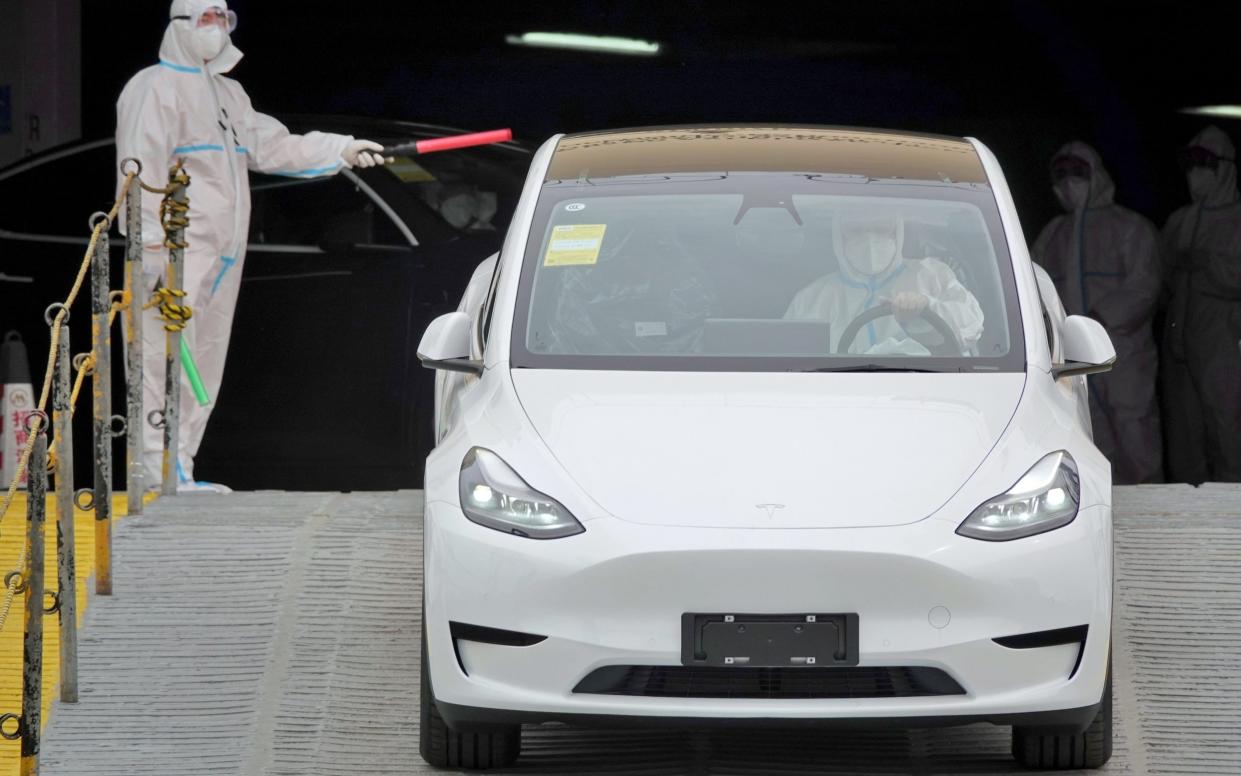Tesla's profits knocked by China factory shutdowns as it sells Bitcoin

Tesla has fallen victim to supply chain chaos in China and a damaging bet on Bitcoin, bringing a record run of profits at Elon Musk’s car company to a sudden end.
The electric vehicle maker also sold off a chunk of its Bitcoin holdings, the company said on Wednesday, as its bet on the cryptocurrency soured.
Revenues at Tesla dropped by 9pc between the second and first quarter to $16.9bn (£14.1bn), though were still 42pc higher than a year earlier.
Its revenues were down on the record three-month revenues of $18.8bn it posted earlier this year amid supply chain woes and a factory shut down in China due to Covid restrictions.
Telsa said it “faced certain challenges, including limited production and shutdowns in Shanghai for the majority of the quarter” but claimed it “continued to make significant progress across the business during the second quarter of 2022”.
Earlier this month, Tesla reported it had delivered more than 254,000 electric vehicles, down from around 300,000 in the previous quarter.
Tesla’s Shanghai factory was shut down for almost two months due to ongoing coronavirus lockdowns in China as the company faced a slew of supply chain woes. However, the electric car maker added it had enjoyed a record month at its Fremont factory and had produced 1,000 vehicles in a single week from its Berlin Gigafactory.
The company said it recorded an operating profit of $2.5bn in the three months ending in June. Shares jumped 4pc in after hours trading in New York after it promised a “record breaking second half of 2022”.
Shares in Tesla have fallen around 40pc so far this year with the tech sell-off wiping hundreds of millions of dollars from the value of the electric car maker despite it posting record results in April. It is currently worth around $770bn.
Still, the electric car maker has remained dominant in the US and has bucked the trend of falling car sales at rival manufacturers. Incumbents such as Volkswagen have seen sales fall to 10 year lows on the back of a supply chain crunch for semiconductors. Sales at Ford fell 17pc earlier this year. BMW sales drop 20pc at its latest set of results.
Emerging Chinese players such as BYD have proved more challenging. BYD topped Tesla’s electric car sales earlier in July.
Its latest results also appeared to mark an end to Mr Musk’s love affair with Bitcoin. Tesla said it had taken an impairment on its Bitcoin holdings and sold 75pc of its cryptocurrency for $936m in cash.
In early 2021, Tesla bought Bitcoin worth $1.5bn, at the time buying the coins at a value of around $36,000. The price of Bitcoin has slumped this year and was worth around $19,000 at the end of June, the end of Tesla’s financial period.
Mr Musk has been outspoken on his fears for the wider economy, warning in June he had a “super bad feeling about the economy”. He also called the company’s factories in Texas and Berlin “gigantic money furnaces” that are burning through billions of dollars.
The Tesla chief executive has laid out plans to cut staff at Tesla by 10pc, calling a recession “inevitable”. Other electric vehicle rivals have been forced to slash jobs. Arrival, a UK electric van company, said it was cutting 800 people, while US electric vehicle maker Rivian is planning to slash hundreds of jobs after its share price collapsed 70pc this year.
Despite the downturn in electric vehicle stocks, Tesla has remained a favourite of retail investors who have flocked to Mr Musk’s company. Its valuation has also been driven up in part by its efforts in automated driving. These were dealt a blow this month by the departure of its head of Autopilot, Andrej Karpathy.
The electric car maker behind the Model 3 and Model Y has already increased the price of its electric vehicles as inflation spikes.
Tesla’s share price has also been weighed down by Mr Musk’s audacious $44bn takeover attempt for Twitter, which has devolved into litigation after the Tesla boss tried to back out of the deal.
The takeover has drawn comparisons to Mr Musk’s last audacious attempt at M&A, which saw him try to take Tesla private at $420 per share in 2018.
Twitter is now attempting to force Mr Musk to go through with the takeover, which was largely to be funded by sales of Tesla stock.
On Tuesday, Twitter won the first phase of its legal fight against Mr Musk, forcing an expedited trial by October. Mr Musk’s legal team had been trying to push back any trial until 2023.
The billionaire argues Twitter has not been open about the number of “bots”, or spam accounts, on the social network. He is using this as his excuse to break off the merger agreement. Twitter, however, argues Mr Musk should be forced to buy Twitter and cannot back out.

 Yahoo News
Yahoo News 
